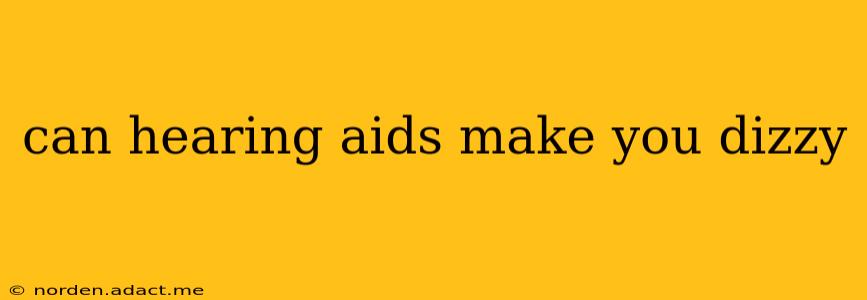Can Hearing Aids Make You Dizzy? Understanding the Link Between Hearing Aids and Dizziness
The short answer is: yes, hearing aids can sometimes cause dizziness, though it's not a common side effect. Many factors can contribute to this feeling, and understanding these is crucial for both users and audiologists. This article will explore the potential causes of dizziness related to hearing aids, offering insights and solutions for a comfortable hearing experience.
Understanding the Connection:
The feeling of dizziness associated with hearing aids isn't directly caused by the device itself. Instead, it's often linked to the adjustments your brain needs to make when it suddenly receives clearer, amplified sound. Think of it as sensory overload – your brain is processing a new range of auditory information it might not be accustomed to. This can be particularly true for individuals who have experienced hearing loss for a considerable period.
What are the common causes of dizziness related to hearing aids?
This is a key question many individuals have. Let's break down the most prevalent reasons:
-
Sudden Sound Amplification: The initial adjustment period is critical. When you first start wearing hearing aids, the amplified sounds can be overwhelming. Your brain needs time to adapt to this new auditory landscape, and during this adaptation, dizziness or lightheadedness can occur. This is often temporary and resolves as you become accustomed to the device.
-
Incorrect Fitting or Programming: An improperly fitted or programmed hearing aid can exacerbate existing balance issues or even trigger them. If the amplification isn't correctly tailored to your specific hearing loss, it can create an unnatural sound environment that disrupts your balance system. A proper fitting and programming by a qualified audiologist is essential to avoid this problem.
-
Ear Infection or Impacted Earwax: Underlying ear problems can contribute to dizziness, irrespective of hearing aids. If you're experiencing dizziness, it's vital to rule out any ear infections or impacted earwax. These conditions can affect your inner ear, which plays a crucial role in balance.
-
Side Effects of Medications: Certain medications can impact your balance and contribute to dizziness. It's essential to discuss any medication you are taking with your doctor and audiologist to ensure there are no drug interactions that could worsen dizziness.
-
Underlying Medical Conditions: Conditions such as Meniere's disease, benign paroxysmal positional vertigo (BPPV), or vestibular neuritis can already cause dizziness, and wearing hearing aids might inadvertently amplify or trigger symptoms. It’s crucial to consult with your physician to address underlying medical issues.
How long does the dizziness from hearing aids last?
The duration of dizziness varies considerably depending on the cause. For many people, the initial dizziness associated with sound amplification is short-lived, lasting only a few days to a couple of weeks as their brain adjusts. However, dizziness stemming from improper fitting, underlying medical conditions, or ear infections could persist longer and require medical attention.
What can I do if my hearing aids make me dizzy?
If you experience dizziness while wearing hearing aids, here's what to do:
-
Consult your Audiologist: This is the most crucial step. Your audiologist can assess the fit and programming of your hearing aids, ensuring they're appropriately tailored to your needs. They can also help determine if any underlying medical condition is contributing to the problem.
-
Gradual Adjustment Period: Start by wearing your hearing aids for shorter periods each day, gradually increasing the duration as you become accustomed to the sound.
-
Reduce the Volume: If the amplification feels overwhelming, lower the volume settings.
-
Address Underlying Conditions: If dizziness persists, consult your doctor to rule out any ear infections or other medical conditions.
-
Consider Alternative Hearing Aid Styles: Different hearing aid styles might offer better comfort and reduce dizziness. Discuss these options with your audiologist.
By addressing potential causes and following these recommendations, many individuals can successfully overcome dizziness associated with hearing aids, enjoying the benefits of improved hearing without discomfort. Remember, the expertise of your audiologist is invaluable in achieving a comfortable and successful hearing aid experience.
